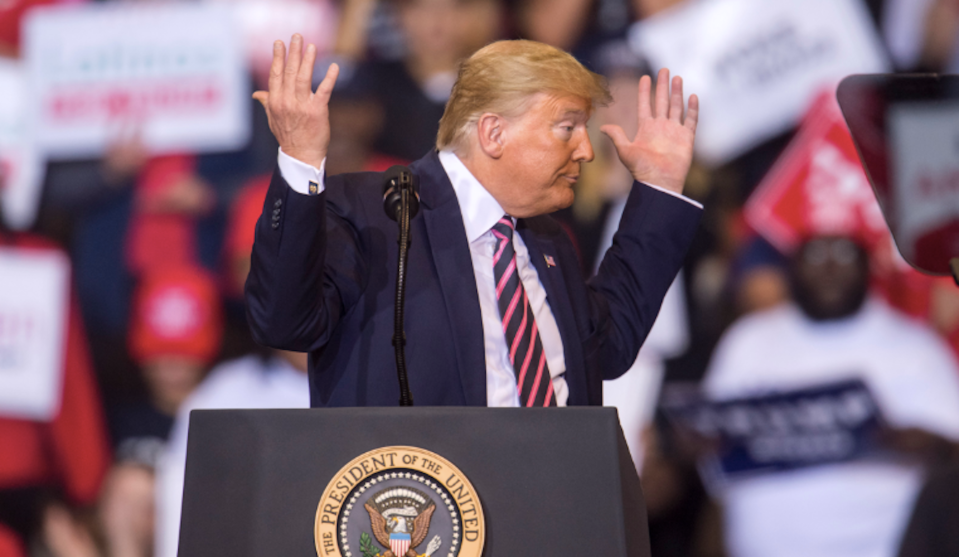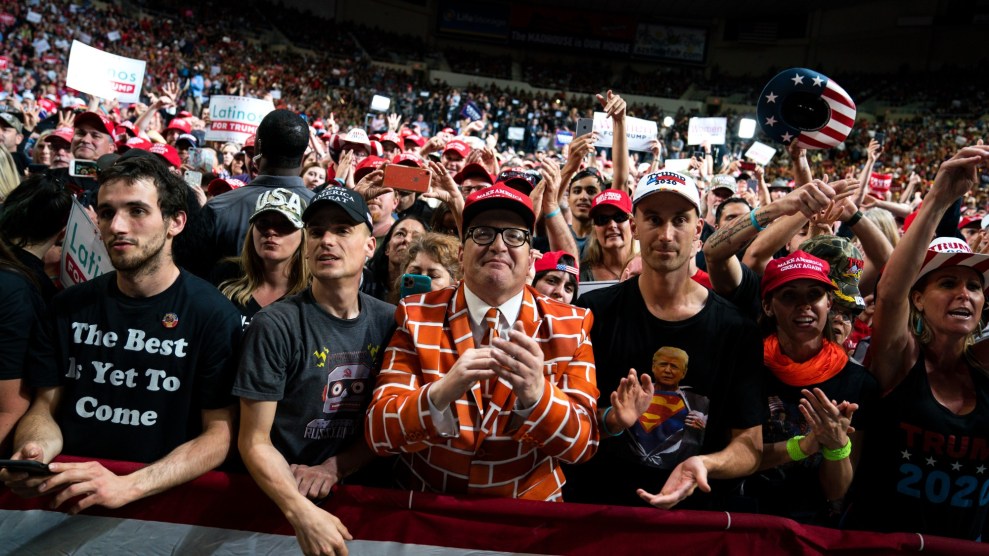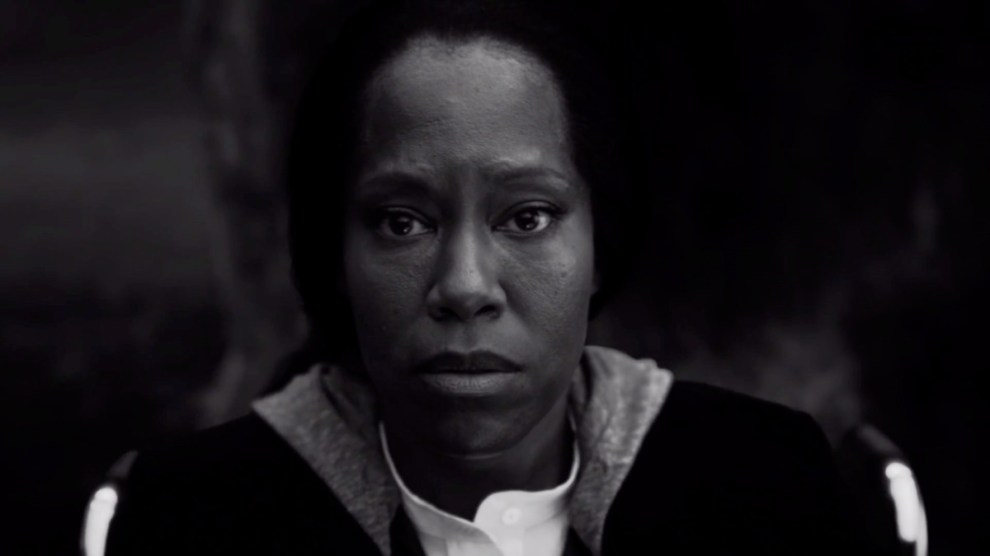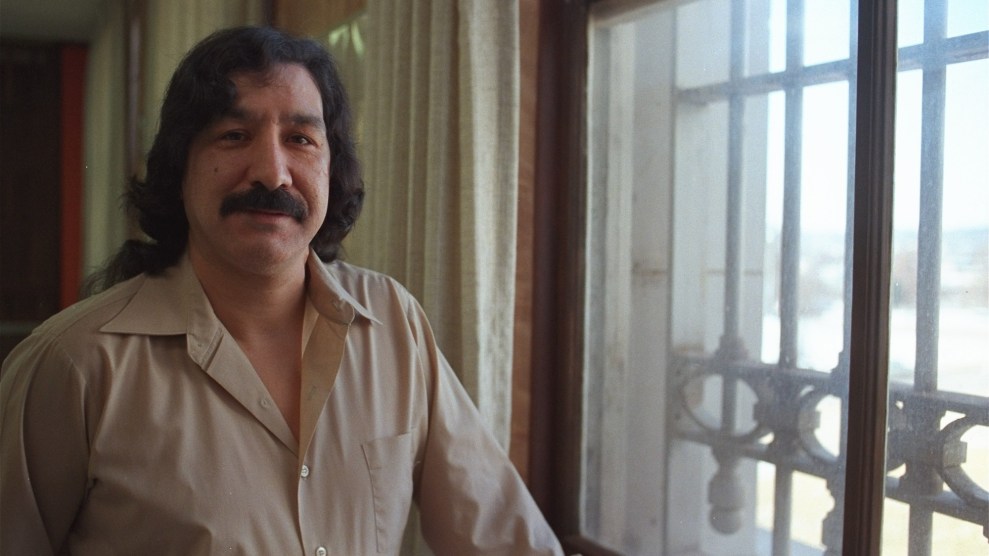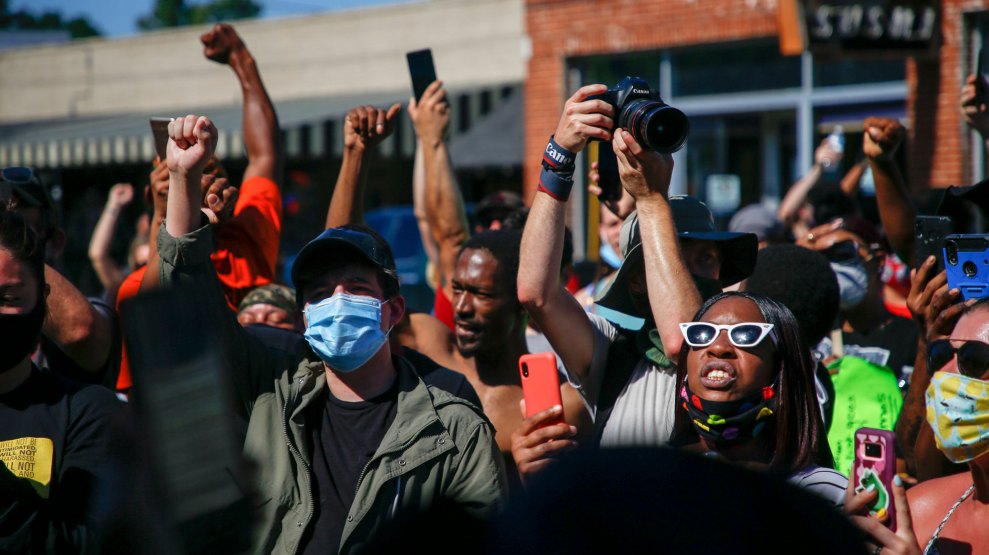
Protesters chant in Tulsa, Okla., on Saturday, May 30, 2020, during a rally to protest the death of George Floyd, a black man who was killed in police custody in Minneapolis on May 25. Ian Maule/Tulsa World/AP
As a child, Greg Robinson II would walk the streets of the Tulsa’s Greenwood District with his father, a longtime community activist in the city and former head of the city’s Civil Service Commission. “My father fought every day,” Robinson II told me this week. “He used to walk around with me and tell me our ancestors’ bodies are underneath the soil and they have not been given proper recognition. They have not been given proper burials and we’re building things over them.”
There had been a massacre here, in what was once known as Black Wall Street—hundreds of Black residents killed, scores of businesses destroyed. In 1921, mobs of white residents shattered the heart of Black prosperity in the United States, just blocks from where, on Saturday, 99 years later, a racist president has decided to hold a rally.
What struck the elder Robinson to the core was the fact that Tulsa had rebuilt itself quite literally on the bones of its people and then just…forgot about it. For years, officials resisted acknowledging the massacre, let alone reckoning with the generations’ worth of reparations due to the descendants of massacre victims. It wasn’t until four months ago, not long after the HBO show Watchmen shocked viewers with a stark recreation of the firebombing of Tulsa, that state education officials added the massacre to its curriculum.
“It was great pain that he went through as somebody who knew the history and wanted to honor the ancestors,” Robinson II told me of his father, who died in 2003, two years after the 1921 Tulsa Race Massacre Centennial Commission acknowledged the massacre and called for reparations, as determined by the Oklahoma legislature. That call went nowhere, but Tulsa activists continue to press the case. Historians estimate that the death toll is a significant underestimate—as many as 300 people could have died. The city had planned to begin a “limited excavation” this summer of possible sites of mass graves as part of an ongoing investigation into the 1921 killings. But then the coronavirus pandemic hit and forestalled that reckoning.
In the recent weeks, as demonstrations erupted throughout the country in response to the killing of George Floyd at the knee of Minneapolis police officer Derek Chauvin, Tulsa residents protested, too—in Floyd’s name and in the name of people who have been killed by Tulsa police, like Terence Crutcher.
Into this collision of past and present comes the race-baiting presence of Donald Trump, who’d originally scheduled the rally for today, Juneteenth, but who reconsidered supposedly on the recommendation of some unnamed Black “friends.” Against the warning of Tulsa’s own health commissioner, Trump has elected to go forward with the event on Saturday. On Juneteenth, the day commemorating the emancipation of slaves, Trump on Twitter issued a thinly veiled threat to “protesters, anarchists, agitators, looters or lowlifes” going to Tulsa for his rally. Meanwhile, Tulsa’s current mayor, G. T. Bynum, rescinded a last-minute curfew put in place in recent days, and the state’s Supreme Court blocked an attempt to prevent Trump’s rally from happening. Robinson II, a community activist in his own right who is on the committee overseeing the mass graves excavation and who is running for mayor this August, has a message for the president: Stay away.
“You’re not coming to bring us justice,” Robinson II says. “So what are you coming for?”
I spoke to Robinson II ahead of Juneteenth festivities in Tulsa about Trump’s visit, what criminal justice reform looks like in Tulsa, and the connection between the Tulsa race massacre and George Floyd’s death. The interview has been edited and condensed for clarity.
How did your father feel about the massacre?
My father fought every day to bring justice to the ancestors. The thing that hurts me the most is that he’s not here today to finish this fight. It’s why I have such a responsibility. He used to walk around with me and tell me our ancestors’ bodies are underneath the soil and they have not been given proper recognition, they have not been given proper burials and we’re building things over them. It hurt him to his core. At that time, the big battle was for the city of Tulsa to acknowledge their part in the race massacre. It was great pain that he went through as somebody who knew the history and wanted to honor the ancestors. Like many of us, we are fighting a white supremacist system, a system that wants to protect order instead of providing justice.
How does today’s Greenwood compare to that of the district before the massacre?
We no longer have control of the Greenwood District. The Greenwood District originally was 40 blocks. We don’t have it on the national registry, which would give it certain protections in terms of what can be built there and who can have a say in that. We don’t own much of the land because it was taken and now has been given to private developers who have developed things like baseball parks and banks and hotels. Nothing wrong with those things, except none of the money from them is benefiting the community from which the land was sold. We just have a few blocks left that are still in African American control, a few buildings left that are in African American control. So it’s infuriating that the city says that they want to honor the race massacre, yet we haven’t figured out a way to provide reparations and tax benefits from revenues that are being created in the Greenwood District and give it to the descendants of the race massacre. That’s ridiculous, and there’s no reason why that can’t happen. It just hasn’t.
We are at this confluence of moments where yet another Black man was killed in police custody while Tulsa is going through this self-reflection. How do you think, given his work, he would have seen things today?
He would have been on the frontlines protesting. But he also would have been on the frontlines pushing for policy. My father was not just an activist. He was the head of the civil service commission for the city of Tulsa. He started and was executive director of Neighborhood Housing Services giving homes to low-income people. I believe he probably would be disappointed that we’re having the same fight that he was having. But he would be demanding justice for the ancestors, but also demanding justice and economic freedom for the Black citizens of Tulsa—so that we can have homes and home values that are rising, so that we can offer them land that stolen from us, so that we can begin to develop and build some of the wealth and opportunities that have been hidden from us for so long. He would not be okay with placating. He would not be okay with waiting longer.
He would be a lot less patient than I am, at this point. People like that, they fight their whole lives. You think about the Maxine Horners of the world, the Regina Goodwins of the world—these are people who have fought for decades for justice, and at every turn have been given an excuse. We’re now at a seminal moment where I think the nation is waking up and saying enough is enough. We are going to get justice or there will be no peace. We are not going to go home at this point. So I think he’d be right there on the frontline teaching us the lessons of the past and demanding justice, as we are today.
What inspired you to run for mayor?
We deserve better. We can do better in this city and across the country. This is a seminal moment where we don’t have time to settle for the status quo. And so we have a mayor right now who has spoken well about issues of racial justice but has not acted on it. This is a mayor who has called reparations divisive. This is a mayor who has said Terence Crutcher’s death was not due to racial bias, but due to his inability to control his drug addiction. This is the mayor who got a large percentage of African American votes, and yet has not done right by African Americans in the city of Tulsa. And so I’m simply running because I don’t believe that justice, freedom, equity, and safety are things that should belong to just one group of people. I think that all Tulsans should have them. I think all Americans should have them.
We can learn from our racial past and create a city that is devoted more to justice than to order, create a city that is welcoming to our immigrant communities, create a city that provides economic opportunity to African American communities and historically oppressed communities, create a community in the middle of the Southwest that says, “We want you here. We want your talent here.” Because that is what has built Tulsa in the past. Oklahoma has always been a land of the migrants, and Tulsa has always been a land of opportunity. But it can’t be a land of opportunity just for one particular group of people. It has to be a land of opportunity for everybody. And we just do not have a leader who is willing to take the moral stands that are necessary to move us forward.
Your senior adviser is Tiffany Crutcher, whose twin brother Terence was killed by a white Tulsa police officer in 2016. [A jury acquitted officer Betty Shelby of manslaughter in 2017.] How did she influence your approach to addressing criminal justice reform?
Dr. Tiffany Crutcher is a nationally renowned figure on how to improve policy and municipalities to protect citizens and to improve the ability of the police department to actually protect and serve, as their duties outline. So I’m glad to have her not just on the campaign but to have worked with her for the past three years on commonsense police reform policies, policies like an Office of the Independent Monitor, with the powers to investigate and to provide recommendations on police use of force investigations. Policies like divesting in enforcement and investing in mental health and public health resources for citizens of Tulsa. Policies like ending the city of Tulsa’s contract with Live PD, which really just put people in the city of Tulsa on TV on their worst days for people to look at them like they were animals. Certainly having a person who is motivated by personal loss but is an example of how we can make policy change in the country on this team is extremely helpful.
Right now, people do not feel safe. They don’t feel protected from with the police department. We just had a situation where two boys who said they were jaywalking in their own neighborhood in downtown Tulsa where people jaywalk every single day. [A video captured Tulsa police handcuffing the Black teenagers in North Tulsa.] Yet no one is being harassed and is arrested by the police department. We had a police officer, Maj. Travis Yates, who said that actually Tulsa police aren’t killing enough Black people, based on his data.
So the police department—and this comes from leadership—has to make it unsafe for bad police officers, for people who have those sorts of ideologies, and they have to have the ability to get rid of bad police officers. We have to go after the Fraternal Order of Police if they’re going to hold the city of Tulsa hostage and not allow for the police officers that are doing good and want to do good to have protection by getting rid of bad officers. That’s the reason we asked for an Office of the Independent Monitor, and yet the FOP is fighting back and spewing misinformation. So there is a tremendous amount of reform that has to go into the police department.
When you look at Floyd’s death and Terence Crutcher’s death and the ensuing protests, and when you look at the fact that 99 years ago Black people in Tulsa were killed, their communities devastated, what if any connections do you see there?
When that police officer stuck his knee on George Floyd’s neck, that was personification for and an example of Black America having their neck stepped on by this white supremacist system that we have in America. And for Black Tulsans having their neck stepped on by the city of Tulsa. It’s the same thing. It’s the same thing, man. You can’t separate that. That’s why, when it happened to George Floyd, we went out and protested not just for George Floyd but for Terence Crusher, not just for Terence Crutcher but for Joshua Barre, not just for Joshua Barre but “Live PD,” not just “Live PD” but to divest in a police department and invest in mental health. Not just to do that, but to have an Office of independent monitoring, not just to do that but to call for reparations for Greenwood, not just to do that, but to call for reparations across the country. It’s the same thing.
Until we are valued as human beings, we have to keep standing up and saying enough is enough. And no, it is not enough for politicians to come and march with us. Politicians’ job is to change policy. So what you didn’t ask me that you should have asked me: What should Donald Trump have been doing? He didn’t have to come to Tulsa. He should have been meeting with members of Congress to pass legislation on reparations. He should have been meeting with members of Congress to pass legislation to build wealth in communities of color. He should have been meeting with the Department of Justice to put pressure on police departments and sheriff’s officers across this country to bring justice to families of excessive force and police brutality. He should have been meeting with Gov. Stitt and Mayor Bynum to see what he could do to support funding for communities of color in the state of Oklahoma and the city of Tulsa. That’s what he should have been. And that’s what public officials should be doing, not marching with us. Police officers don’t need to kneel with us. They need to change policies within their department
So that’s what it meant. That’s why everybody from across the country stood up because we said enough is enough. I am George Floyd. We can’t breathe. Not, I can’t breathe. We cannot breathe.

